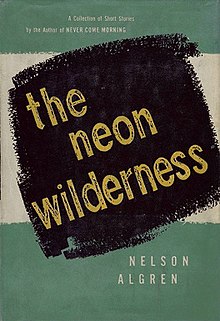Informatics Educational Institutions & Programs
Contents
 First edition | |
| Author | Nelson Algren |
|---|---|
| Country | United States |
| Language | English |
| Genre | Short stories: tragi-comedy, satire |
| Publisher | Doubleday & Co. |
Publication date | 1947 |
| Media type | Print (hardcover) |
| Pages | 286 (1st ed.) |
| OCLC | 1117160 |
| 813.52 | |
The Neon Wilderness (1947) is the first short-story collection by American writer Nelson Algren. Two of its stories[1] had received an O. Henry Award. Algren received an award from the American Academy of Arts and Letters[2] the same year.
Overview
The book collects 24 stories: 8 previously published (from 1933 to 1947)[3][4] and 16 new. Most of them are set in then-contemporary Chicago (1930s and 1940s), in the so-called "Polish-American ghetto". They revolve around the lower classes: workers and unemployed, drunkards and gamblers, prostitutes and hustlers, small-businessmen and policemen. Unlike Dickens or Zola, their general tone is tragi-comedy or sympathetic satire.
Two stories had received an O. Henry Award (and been reprinted in the related annual volume): Algren's second-published story "The Brothers' House"[1] (1935 award) and "A Bottle of Milk for Mother (Biceps)"[1] (1941 award). Two had been selected for The Best American Short Stories: "A Bottle of Milk for Mother"[4] (as "Biceps",[5] 1942 volume) and "How the Devil Came Down Division Street"[4] (1945 volume). The year the collection was released, Algren received an award from the American Academy of Arts and Letters and a grant from Chicago's Newberry Library.[2]
Contents
The collection contains the following 24 stories (with first appearance for the 8 previously published).
- "The Captain Has Bad Dreams"
- "How the Devil Came Down Division Street" (1944, Harper's Bazaar)[6]
- "Is Your Name Joe?"
- "Depend on Aunt Elly"
- "Stickman's Laughter" (1942, The Southern Review)[4]
- "A Bottle of Milk for Mother" (1941, as "Biceps",[5] The Southern Review)[4]
- "He Couldn't Boogie-Woogie Worth a Damn"
- "A Lot You Got to Holler"
- "Poor Man's Pennies"
- "The Face on the Barroom Floor" (1947,[n. 1] The American Mercury)[4]
- "The Brothers' House" (1934, Story magazine)[4]
- "Please Don't Talk About Me When I'm Gone"
- "He Swung and He Missed" (1942, The American Mercury)[4]
- "El Presidente de Méjico"
- "Kingdom City to Cairo"
- "That's the Way It's Always Been"
- "The Children" (1943, The American Mercury)[4]
- "Million-Dollar Brainstorm"
- "Pero Vencermos"
- "No Man's Laughter"
- "Katz"
- "Design for Departure"
- "The Heroes"
- "So Help Me" (1933, Story magazine)[4]
Notes
- ^ That first appearance was as "The Face on the Barroom Floor, or Too Much Salt on the Pretzels". (See Contento reference.)
References
- ^ a b c Random House, "O. Henry Award Winners 1919–1999", Bold Type (via Archive.org)
- ^ a b Google Books, The Neon Wilderness: "Algren received a 1947 Award from the American Academy of Arts and Letters and a grant from Chicago's Newberry Library."
- ^ Brooke Horvath, Understanding Nelson Algren, University of South Carolina Press, 2005, ISBN 978-1-57003-574-6, p. 167.
- ^ a b c d e f g h i j Chicago Public Library, "The Nelson Algren Collection" (1933–1999), Special Collections, 2005 — Partial bibliography with editions and printings, first appearances and reprintings, reviews and notices, etc.
- ^ a b WorldCat, "A bottle of milk for mother" (1941): "From the Southern Review under the title of 'Biceps'. In O. Henry memorial award prize stories of 1941."
- ^ William G. Contento, "Stories: Algren, Nelson", in "Miscellaneous Anthologies Index" ("updated March 17, 2015"), Homeville: Bibliographic Resources (at Phil Stephensen-Payne's Galactic Central)
External links
- The Neon Wilderness at Seven Stories Press (current edition, 1997)

















